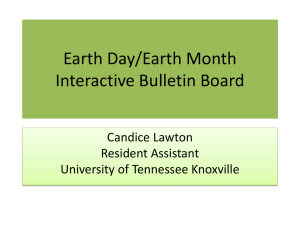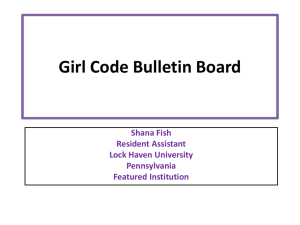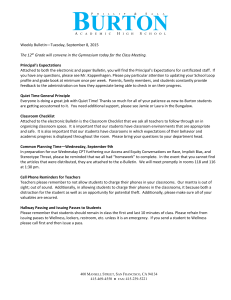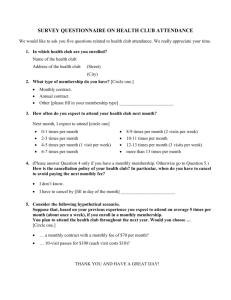Fiction Books and Videos
advertisement
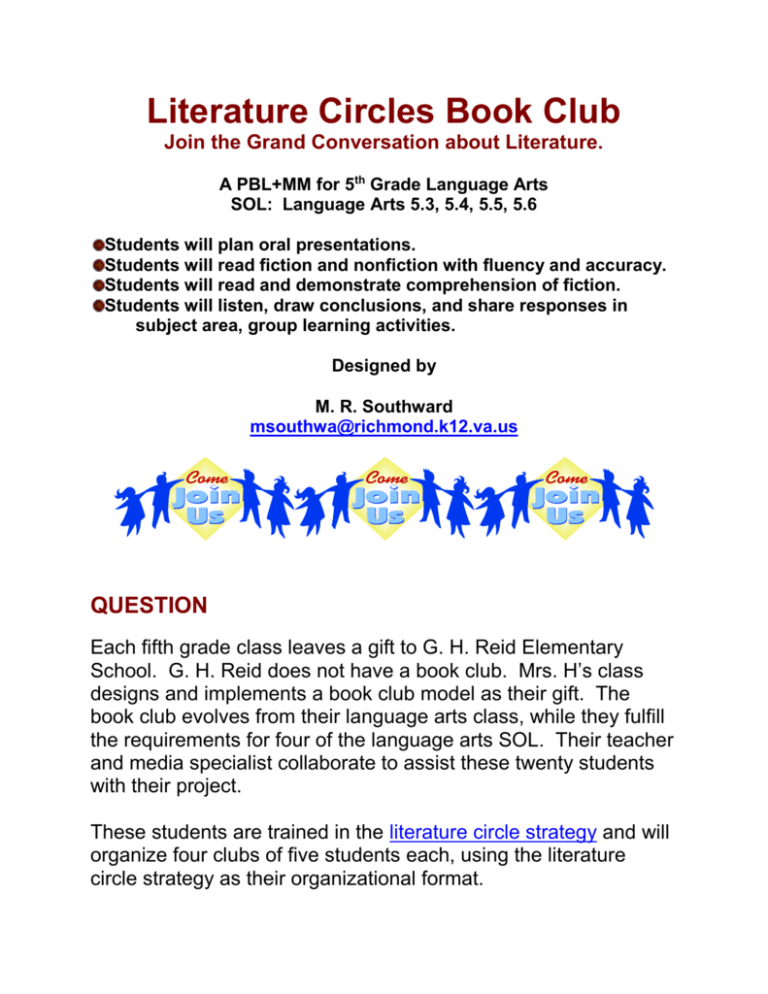
Literature Circles Book Club Join the Grand Conversation about Literature. A PBL+MM for 5th Grade Language Arts SOL: Language Arts 5.3, 5.4, 5.5, 5.6 Students will plan oral presentations. Students will read fiction and nonfiction with fluency and accuracy. Students will read and demonstrate comprehension of fiction. Students will listen, draw conclusions, and share responses in subject area, group learning activities. Designed by M. R. Southward msouthwa@richmond.k12.va.us QUESTION Each fifth grade class leaves a gift to G. H. Reid Elementary School. G. H. Reid does not have a book club. Mrs. H’s class designs and implements a book club model as their gift. The book club evolves from their language arts class, while they fulfill the requirements for four of the language arts SOL. Their teacher and media specialist collaborate to assist these twenty students with their project. These students are trained in the literature circle strategy and will organize four clubs of five students each, using the literature circle strategy as their organizational format. Literature circles are small, cooperative groups of students who gather to read, discuss, and analyze the same book or unit of study. They select books and assign roles to anchor their discussion. They demonstrate comprehension by written, illustrative, oral, and presentation responses. The literature circle strategy is driven by student choice of literature and management style, and characterized by the roles of group participants. The strategy may be modified for any age group and/or reading level. Research indicates that test scores improve when the literature circle strategy is implemented, following one or a combination of literature circle models. More information is available about literature circles at the links listed in this PBL. PLAN What Will They Do? Each group meets daily, during the language arts block, for at least one hour, during the second semester. They select fiction titles from the list of multi-book sets in their media center. During the semester, they read, discuss, explore author and book information, keep a journal, video tape and photograph their sessions, maintain a bulletin board to show progress, utilize graphic organizers, research print and online resources, design and take comprehension tests, create weekly in-class presentations, and create a culminating presentation for a May assembly. During the May assembly, groups present their literary “gift” to the school. Utilizing their video clips, Power Point creation, and oral presentation talents, they show rising fourth and fifth graders how to use their book club model to master the language arts SOL, and most important, how to become enthusiastic life long readers and members of the “Grand Conversation” about literature. Students request a list of fiction book sets and supportive videos from their media specialist. Students decide to form their club groups by a blind drawing. Using the mono colored (red, blue, green, yellow) bookmarks they created in anticipation of their book club project, they draw bookmarks from a container. Like-colored bookmarks determine the four groups of five members each. Groups select a meeting area from choices given by their teacher/media specialist. Two groups choose a corner of the media center and two groups choose classroom areas. Groups may switch meeting areas during the semester. Each group member receives a three-ring notebook, which contains the following: Dividers and section header pages Calendar indicating project due dates Review of the literature circle process and expectations Literature circle roles and responsibilities Literature circle self assessment forms Cooperative group management suggestions and expectations List of resources Book and video list Elements of fiction Graphic organizers to be copied as needed Venn Diagram Story Map Literature Web Story Circle Fiction Comprehension Timeline Vocabulary Web Fiction Comprehension Test Format Story Board What Will They Use? Fiction Books and Videos From fiction book sets and videos on reserve in the media center, groups select titles for their project. They may add/delete titles according to interest, reading level, and availability. Groups are expected to read, discuss, analyze, and respond to at least one book per week. Mississippi Bridge by Mildred Taylor Goony Bird Green by Lois Lowry Bridge to Terabithia by Katherine Patterson Train to Somewhere by Eve Bunting Winder Room by Gary Paulsen A Life Remembered, Sarny by Gary Paulsen Fire at the Triangle Factory by Holly Litchfield Because of Winn Dixie by Kate Di Camillo Cousins by Virginia Hamilton James and the Giant Peach by Roald Dahl The Wide Window by Lemony Snicket In the Austere Academy by Lemony Snicket Best Christmas Pageant Ever by Barbara Robinson Missing Gator of Gumbo Grove by jean Craighead George On My Honor by Marian Dane Bauer A Fine White Dust by Judith Viorst House of Dies Drear by Virginia Hamilton Amos Fortune, Free Man by Elizabeth Yates Hundred Penney Box by Sharon Bell Mathis Tamika and the Wisdom Rings by Camille Yarbrough The Friendship and The Gold Cadillac by Mildred Taylor Sounder by William H. Armstrong The Door in the Wall by Marguerite De Angeli Online Resources http://KidsReads.com Author Studies Homepage http://tznet.com/bookswi About the Authors ThinkQuest Literature: Award Winners Literature Themes: Friendship Literature: Online Stories for Children Literature: “Ralph S. Mouse” by Beverly Cleary Literature: “Flat Stanley” by Jeff Brown Literature: “Koala Lou” by Mem Fox Literature: Story Elements Literature: Online Activities Goals Students determine the following goals: SOL Mastery (student-teacher designed comprehension tests, and SOL tests in June) Project bulletin board All written responses for at least one book per week Five-minute class presentation (with MM) each week Fifteen-minute culminating assembly presentation (with MM) Students enjoy positive peer pressure and competition between the literature circle groups. SCHEDULE How will they show what they learn? Students monitor each other for homework, and use the self assessment check-list during their reading-discussion sessions. Each student turns in the following: At Least Once Each Week Students assist with the design of the comprehension tests, and request the test upon completion of each book. Every Friday At least four graphic organizers per book Journal entry and one typed page relating to the current selection or the author, utilizing at least two print and or online sources, cited correctly Every Other Friday One typed page comparing/contrasting authors/books, including online author correspondence Use two sources cited correctly. Every Other Friday One typed page about book/literary clubs (local, state, national, international), utilizing print sources, online sources, and or personal interviews, cited correctly Reports include information about book clubs for book purchase and or reading-discussion book clubs. Book Club Resources http://kidsreads.com/clubs/index.asp http://bookbrowse.com/bookclubfun/index.cfm http://bookclublocator.com/ http://i-une.com/search.php?q=Book+Club Local telephone book Personal interviews with students/adults with book club experience Weekly Update project bulletin board. Each group will maintain a full bulletin board advertising their book club for the duration of the project. Requirements: Enhanced graphic organizers Original illustrations and book cover copies “Site Bite” text summaries Selected reports Digital camera pictures of group members Title list Decorations Accurate and attractive Weekly Each group presents a five-minute advertisement of one or more of the books they have read/are reading. They must incorporate some form of technology to enhance their book promotion. Students complete the peer/self assessment rubric. The rubric appears below. In-Class Presentation Book Title__________________________________________ Name of Presenter________________________________________________________ Date of Presentation_______________________________________________________ SKILL 1 2 3 4 EYE CONTACT WITH AUDIENCE Very little Sometimes Most of the time Always POSTURE Slumped, Feet shifting Standing straight, with feet flat on the floor sometimes Sometimes clear Standing straight, with feet flat on the floor most of the time Clear most of the time Excellent posture Somewhat prepared with information Used, but not prepared well Well prepared with information Somewhat prepared Expert preparation STANDING STRAIGHT FEET FLAT ON FLOOR VOICE GOOD PRONOUNCIATION GOOD VOLUME FOR THE ROOM PREPARED WITH INFORMATION MULTIMEDIA Not clear Not prepared with information Not used Every word clear and understood Excellent use of multimedia. VIDEO, POWER POINT/TRANSPARENCIES Total Points____________________________________ SCHEDULE DETAIL (based on the 2003-2004 calendar) Due Dates 1/12/04 Project begins with first group meeting Receive materials. Select first title. Organize and assign literature circle roles for the first book. Read and discuss. Assign home-work. Begin bulletin board plan. 1/16/04 Complete book #1. Turn in response sheets, journal entry, and reports. Bulletin board Five-minute class presentation Select book #2. 1/23/04 Complete book #2. Turn in response sheets, journal entry, and reports. Turn in comparative author/book report. Bulletin Board Five-minute class presentation Select book #3. 1/30/04 Complete book #3. Turn in response sheets, journal entry, and reports. Turn in book club report. Bulletin Board Five-minute class presentation Select book #4. 2/6/04 Complete book #4. Turn in response sheets, journal entry, and reports. Turn in comparative author/book report. Bulletin board Five-minute class presentation Select book #5. 2/13/04 Complete book #5. Turn in response sheets, journal entry, and reports. Turn in book club report. Turn in 1st draft of Power Point plan and presentation, using story board and timeline organizers. Bulletin board Five-minute class presentation Select book #6. 2/20/04 Complete book #6. Turn in response sheets, journal entry, and reports. Turn in comparative author/book report. Bulletin board Five-minute class presentation Select book #7. 2/27/04 Complete book #7. Turn in response sheets, journal entry, and reports. Turn in book club report. Bulletin board Five-minute class presentation Select book #8. 3/5/04 Complete book #8. Turn in response sheets, journal entry, and reports. Turn in comparative author/book report. Bulletin board Five-minute class presentation Select book #9. 3/12/04 Complete book #9. Turn in response sheets, journal entry, and reports. Turn in book club report. Turn in 2nd draft of Power Point plan and presentation, using story board and timeline organizers. Bulletin board Five-minute class presentation Select book #10. 3/19/04 Complete book #10. Turn in response sheets, journal entry, and reports. Turn in comparative author/book report. Bulletin board Five-minute class presentation Select book #11. 3/26/04 Complete book #11. Turn in response sheets, journal entry, and reports. Turn in book club report. Bulletin board Five-minute class presentation Select book #12. 4/2/04 Complete book #12. Turn in response sheets, journal entry, and reports. Turn in comparative author/book report. Bulletin board Five-minute class presentation Select book #13 4/9/04 Easter Week Read ahead, work on response sheets and reports. 4/16/04 Complete book #13. Turn in response sheets, journal entry, and reports. Turn in book club report. Turn in 3rd draft of Power Point plan and presentation, using story board and timeline organizers. Bulletin board Five-minute class presentation Select book #14. 4/23/04 Complete book #14. Turn in response sheets, journal entry, and reports. Turn in comparative author/book report. Bulletin board Five-minute class presentation Select book #15. 4/30/04 Complete book #15. Turn in response sheets, journal entry, and reports. Turn in book club report. Turn in 4th draft of Power Point plan and presentation, using story board and timeline organizers. Turn in details of the May presentation, showing responsibilities of group members and a timeline of the presentation. Bulletin board Five-minute class presentation Select book #16. 5/7/04 Complete book #16. Turn in response sheets, journal entry, and reports. Turn in final comparative author/book report. Bulletin board Five-minute class presentation, including some of Power Point and video for the May assembly Select book #17. 5/14/04 Complete final book #17. Turn in response sheets, journal entry, and reports. Turn in final book club report. Bulletin board Five-minute class presentation, including some of Power Point and video for final presentation 5/21/04 Turn in final copy of Power Point, with transparencies, and presentation plan. Turn in final copy of group member responsibilities and contingency plan for absences and equipment malfunction. Turn in a one-page summary-evaluation-assessment of the literature circles book club experience. 5/28/04 Each group gives their fifteen-minute presentation during the assembly for 3rd, 4th, and 5th graders. Book club party follows! Power Point and video clips run, while students share snacks, book club evaluations, and lots of book talk with their parents. PROJECT During the first meeting, groups are responsible for the following: Select group name. Discuss group management and assign literature circle for their first book. Select first book. Read, discuss, and write journal notes. Assign reading and roles for next session. Review the literature circle self-assessment form. *Journal Entry Form: “My Book Club Journal” Name of Book________________________________________________ Author______________________________________________________ Spine label________ Publication Date_____________________________ Place of Publication____________________________________________ Number of pages______________________________________________ Date of meeting_______________________________________________ Literature circle role assignments ______________________________________________ ______________________________________________ ______________________________________________ Book-discussion notes_________________________________________ Self-group assessment Literature Circle Roles Each of the five group members will be responsible for one of the five literature circle discussion roles for each book read by the group. The links below are for educators who may not be familiar with the literature circle process. Students taking part in the project have a modified explanation of the literature circle roles and responsibilities. Groups may rotate roles for each book or more often. They are expected to become experts in all discussion roles. Roles are listed below and linked to explanations: Summarizer Vocabulary Director Literary Director Connector Author Director During each meeting, students read, discuss, take notes, self-peer assess using the form provided, and assign homework and literature roles. During each meeting, students check calendar for due dates, assign responsibilities, and monitor progress towards the final presentation. During each meeting, students may video tape and take digital camera pictures for the bulletin board and the class/assembly presentations. The following materials and resources are provided by the classroom teacher and the media specialist: Twenty-three fiction book sets and supporting videos on reserve in the media center Online and CD ROM resources Three ring binders, lined paper, and section dividers for items referred to in the “Plan” section of this PBL Bulletin board materials Video and digital cameras, tapes, discs, and TV-VCR Computer and printer supplies and sign up sheet Copy paper Transparencies ASSESSMENT Student work is evaluated individually, and as a group. Individual grades are assigned for weekly graphic organizers, book and author reports, book club reports, and teacher–student designed comprehension tests. Five rubrics are used for teacher/peer/self/group assessments. Rubrics are used to assess the following: Literature circles self and peer participation In-class weekly group presentation (shown in “Plan” section of this PBL) Four-week group progress (shown below) Culminating group presentation (shown below) Multimedia product (shown below) Four-week Group Progress The teacher and media specialist use this rubric four times during the semester. Date__________________________________________ Group members: SKILL SOCIAL: 5 One or more members not cooperative, collaborative more than 4 times COOPERATIVE, COLLABORATIVE GROUP/ SELF MANAGEMENT HOUSEKEEPING: Did not leave area clean, neat, in place *SPACE and/or EQ lost or *MATERIALS neglected *EQ more than 4 times EVERYTHING CLEAN, NEAT, IN PLACE Individual/group DUE DATES: missed more than 4 *WRITTEN WORK due dates *JOURNAL *BULLETIN BOARD *DRAFTS *PRESENTATIONS One book BOOKS COMPLETE: 10 One or more members not cooperative, collaborative 3 or 4 times 15 One or more members not cooperative, collaborative 1 or 2 times 20 Great group management! Did not leave area clean, neat, in place and/or EQ lost or neglected 3 or 4 times Did not leave area clean, neat, in place and/or EQ lost or neglected 2 times Perfect housekeeping! Individual/group Individual/group missed 3 or 4 missed 1 or 2 due dates due dates Always on time! Two books Four books Three books READ, DISCUSSED, REPORTED, PRESENTED TOTAL POINTS_______________________________________________________________ Final Presentation Date____________________ Group Participants_____________________________________ ____________________________________________________ ________________________________________ SKILL SOCIAL: *EYE CONTACT *POSTURE *VOICE CONTENT: *SUMMARY *DETAILS CONNECTION: *SEAMLESS FLOW BETWEEN SECTIONS AND PARTICIPANTS MM: *VIDEO CLIPS *POWER PT/ TRANSPARENCY PACKAGE: *APPROPRIATE ATTIRE *STAGING AND PROPS 1 2 3 4 Poor eye contact, posture, voice projection more than 4 times Poor eye contact, posture, voice projection 3 or 4 times Poor eye contact, posture, voice projection 1 or 2 times Academy Award! Left out many elements of the project Summary was adequate, but details were weak Good summary and details included Academy Award! “Dead air time”/confusion more than 3 times “Dead air time”/confusion 2 or 3 times “Dead air time”/confusion 1 time Academy Award! One or both were not included. Both were included, but one or both were weak in content/display. Both included, and demonstrated good content and display Academy Award! One or more participants did not dress appropriately and staging/props were not planned/used. All dressed appropriately. All dressed appropriately. ACADEMY AWARD! Props/staging used, but not well planned Props/staging used and well planned TOTAL POINTS_________________________________________________________ Multimedia (VHS video clips and Power Point) Date_______________________________________________________ Group members______________________________________________ ___________________________________________________________ SKILL 1 2 CONTENT: *ACCURATELY CONVEYS GROUP ACTIVITY AND INFORMATION Although present, neither video clips nor Power Point accurately displayed the group activity or the information. Either the video clips or the Power Point accurately displayed the group activity and the information. LANGUAGE: (WRITTEN/SPOKEN) *SPELLING *GRAMMAR *PUNCTUATION More than 3 language errors 2 or 3 language errors DESIGN: *EASY TO VIEW AND HEAR *BALANCE *CLARITY *SPACE *TEMPO CREATIVITY: *COLOR *GRAPHICS *ANIMATION *EDITING *BACKGROUND *CROPPING More than 3 segments displayed design weakness EQUIPMENT: WELL REHEARSED FOR BEST VISUAL/AURAL EFFECT 3 4 Both video clips and the Power Point accurately displayed the group activity and the information. 1 language error Experts! 2 or 3 segments displayed design weakness 1 segment displayed design weakness Experts! No use of creativity to enhance content 2 examples of creativity to enhance content Many examples of creativity to enhance content Experts! More than 2 equipment problems that could have been solved with rehearsal 2 equipment problems that could have been solved with rehearsal 1 problem that could have been solved with rehearsal Experts! Experts! TOTAL POINTS________________________________________________________ CREDITS and REFERENCES Richmond Public Schools Curriculum Framework Richmond Public Schools Pacing Charts “Project-Based Learning plus Multimedia (PBL+MM) Template, by Jill Baedke, VCU instructor “Literature Circles, In Search of the Grand Conversation”, document by Michael Kight and Mary Southward, VCU Research Consortium Project, 1996 Current Literature Circle websites G. H. Reid Elementary media center collection Richmond Public Schools video catalog (Medianet) Websites supporting VCU TEDU500 course, spring 2004 Congratulations to our life-long readers who join in the “Grand Conversation” about Literature!
